Isa Miranda (1905–1982) was the only international film star produced by the Italian fascist cinema. In Hollywood she was billed as the ‘Italian Marlene Dietrich’, and played femme fatale roles. Later she became one of the most significant European film actresses during the 1940s and early 1950s.
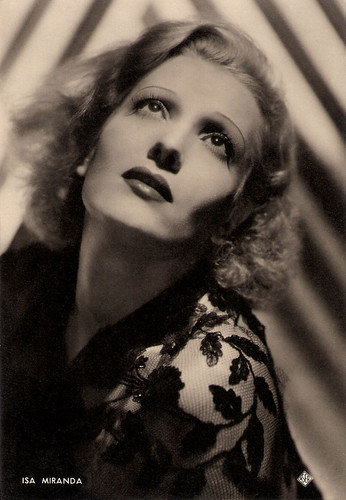
Italian postcard by ASER (A. Scaramaglia Edizoni), Roma (Rome), no. 47.
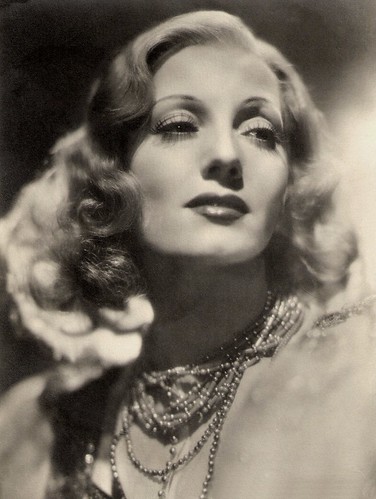
Italian card by ASER (A Scarmiglia Ed.), Rome.
Everybody's Woman
Isa Miranda was born Ines Isabella Sampietro in Milan, Italy in 1905. She worked as a typist while training as an actress at the Milan Academy. She went on to play bit parts in Italian films in Rome. She played a bigger role in Come le foglie/Like the Leaves (1934, Mario Camerini). Success came with Max Ophüls' film La Signora di tutti/Everybody's Woman (1934) in which she played Gaby Doriot, a famous film star and adventuress with whom men cannot help falling in love. Having brought several of them to their ruin, she slits her wrists. This was perhaps Miranda's finest screen performance and it brought in its wake several film offers. She appeared next in Passaporto rosso/Red Passport (1935, Guido Brignone) and Il diario di una donna amata/Affairs of Maupassant (1935, Hermann Kosterlitz aka Henry Koster). In Germany she starred in Du bist Mein Gluck/You Are My Joy (1936, Karl Heinz Martin) opposite the great Operatic tenor Beniamino Gigli, and in France in L'homme de nulle part/The Late Mathias Pascal (1937, Pierre Chenal), a film adaptation of Luigi Pirandello's Il Fu Mattia Pascal, and in Le Mensonge de Nina Petrova/The Lie of Nina Petrova (1937, Victor Tourjansky). Her international popularity was such that she even survived her leading lady stint in Scipio Africanus/Scipio, the African (1937, Carmine Gallone), a notorious Italian government-funded historical epic produced by Benito Mussolini's son, Vittorio. In 1939, Paramount Pictures gave her a contract, and billed her as the ‘Italian Marlene Dietrich’. She played femme fatale roles in such films as Hotel Imperial (1939, Robert Florey) and Adventure in Diamonds (1940, George Fitzmaurice). Hal Erickson at AllMovie describes them as 'forgettable fripperies' in which she recited her lines phonetically.
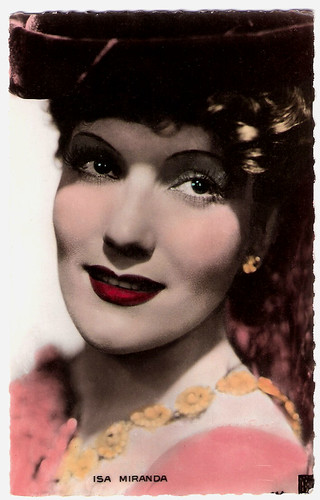
French postcard by Editions et Publications Cinématographiques (EPC).
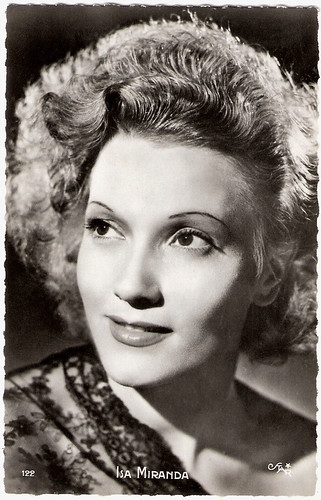
French postcard bu Editions P.I., Paris, no. 122. Photo: Star.
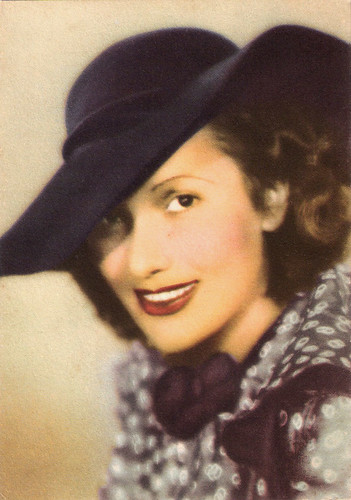
Italian postcard by NMM, Milano, 1941.
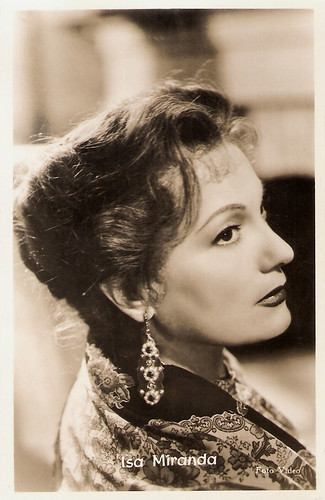
Prob. Italian postcard. Photo: Foto Video.
Golden Palm
Isa Miranda returned to Italy soon after the outbreak of World War II and continued to act on stage and to make films. Among her films were Senza cielo/Without the Sky (1940, Alfredo Guarini) opposite Fosco Giachetti, Malombra (1942, Mario Soldati) with Andrea Checchi, Zazà (1944, Renato Castellani) and the comedy Lo sbaglio di essere vivo/My Widow and I (1945, Carlo Ludovico Bragaglia) with Vittorio De Sica. In 1949, she starred with Jean Gabin in Au-Dela Des Grilles/The Walls of Malapaga (1949, René Clément) which won an Academy Award for the most outstanding foreign language film, and for Miranda, the Palme d'Or (Golden Palm) at the Cannes Film Festival. Another success of that period was La Ronde/Roundabout (1950, Max Ophüls). Her career took her to France, Germany and England, where she frequently appeared in TV films, including an engaging performance as a campy villain on the tongue-in-cheek espionage series The Avengers (1967). Notable film appearances include Siamo donne/We, the Women (1953, Luigi Zampa), a portmanteau film where Miranda shared the screen with three other screen legends, Anna Magnani, Alida Valli and Ingrid Bergman, Summertime (1955, David Lean) with Katherine Hepburn, Gli Sbandati/Abandoned (1955, Francesco Maselli), La Noia/The Empty Canvas (1963, Damiano Damiani) with Bette Davis, The Yellow Rolls-Royce (1964, Anthony Asquith) with Ingrid Bergman, The Shoes of the Fisherman (1968, Michael Anderson) starring Anthony Quinn, and Il portiere di notte/The Night Porter (1974, Liliana Cavani) with Dirk Bogarde and Charlotte Rampling. Her last film was the romantic comedy Le farò da padre/I'll Take Her Like a Father (1974, Alberto Lattuada). Since then she made a few film appearances in TV-mini-series like L'assassinio di Federico Garcia Lorca/The Assassination of Federico Garcia Lorca (1976, Alessandro Cane). Isa Miranda died in Rome in 1982. She was married to the Italian director and producer Alfredo Guarini until his death in 1981.
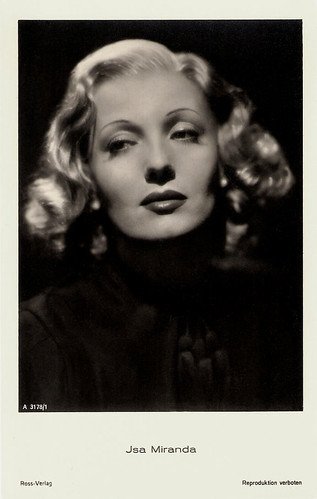
German postcard by Ross Verlag, no. A 3178/1, 1941-1944.
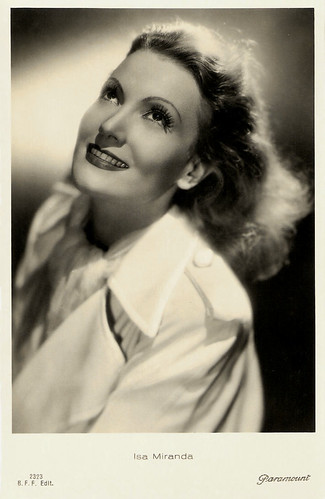
Italian postcard. Ballerini & Fratini Firenze Ed., No. 2323. Paramount.
Trailer of the comedy Arrivano i dollari/The Dollars are Coming (1957, Mario Costa) with Alberto Sordi, Mario Riva, Nino Taranto, Isa Miranda, and Riccardo Billi. Source: 666Rebell666 (YouTube).
Sources: Giuseppe Alessi (IMDb), Hal Erickson (AllMovie), Wikipedia and IMDb.

Italian postcard by ASER (A. Scaramaglia Edizoni), Roma (Rome), no. 47.

Italian card by ASER (A Scarmiglia Ed.), Rome.
Everybody's Woman
Isa Miranda was born Ines Isabella Sampietro in Milan, Italy in 1905. She worked as a typist while training as an actress at the Milan Academy. She went on to play bit parts in Italian films in Rome. She played a bigger role in Come le foglie/Like the Leaves (1934, Mario Camerini). Success came with Max Ophüls' film La Signora di tutti/Everybody's Woman (1934) in which she played Gaby Doriot, a famous film star and adventuress with whom men cannot help falling in love. Having brought several of them to their ruin, she slits her wrists. This was perhaps Miranda's finest screen performance and it brought in its wake several film offers. She appeared next in Passaporto rosso/Red Passport (1935, Guido Brignone) and Il diario di una donna amata/Affairs of Maupassant (1935, Hermann Kosterlitz aka Henry Koster). In Germany she starred in Du bist Mein Gluck/You Are My Joy (1936, Karl Heinz Martin) opposite the great Operatic tenor Beniamino Gigli, and in France in L'homme de nulle part/The Late Mathias Pascal (1937, Pierre Chenal), a film adaptation of Luigi Pirandello's Il Fu Mattia Pascal, and in Le Mensonge de Nina Petrova/The Lie of Nina Petrova (1937, Victor Tourjansky). Her international popularity was such that she even survived her leading lady stint in Scipio Africanus/Scipio, the African (1937, Carmine Gallone), a notorious Italian government-funded historical epic produced by Benito Mussolini's son, Vittorio. In 1939, Paramount Pictures gave her a contract, and billed her as the ‘Italian Marlene Dietrich’. She played femme fatale roles in such films as Hotel Imperial (1939, Robert Florey) and Adventure in Diamonds (1940, George Fitzmaurice). Hal Erickson at AllMovie describes them as 'forgettable fripperies' in which she recited her lines phonetically.

French postcard by Editions et Publications Cinématographiques (EPC).

French postcard bu Editions P.I., Paris, no. 122. Photo: Star.

Italian postcard by NMM, Milano, 1941.

Prob. Italian postcard. Photo: Foto Video.
Golden Palm
Isa Miranda returned to Italy soon after the outbreak of World War II and continued to act on stage and to make films. Among her films were Senza cielo/Without the Sky (1940, Alfredo Guarini) opposite Fosco Giachetti, Malombra (1942, Mario Soldati) with Andrea Checchi, Zazà (1944, Renato Castellani) and the comedy Lo sbaglio di essere vivo/My Widow and I (1945, Carlo Ludovico Bragaglia) with Vittorio De Sica. In 1949, she starred with Jean Gabin in Au-Dela Des Grilles/The Walls of Malapaga (1949, René Clément) which won an Academy Award for the most outstanding foreign language film, and for Miranda, the Palme d'Or (Golden Palm) at the Cannes Film Festival. Another success of that period was La Ronde/Roundabout (1950, Max Ophüls). Her career took her to France, Germany and England, where she frequently appeared in TV films, including an engaging performance as a campy villain on the tongue-in-cheek espionage series The Avengers (1967). Notable film appearances include Siamo donne/We, the Women (1953, Luigi Zampa), a portmanteau film where Miranda shared the screen with three other screen legends, Anna Magnani, Alida Valli and Ingrid Bergman, Summertime (1955, David Lean) with Katherine Hepburn, Gli Sbandati/Abandoned (1955, Francesco Maselli), La Noia/The Empty Canvas (1963, Damiano Damiani) with Bette Davis, The Yellow Rolls-Royce (1964, Anthony Asquith) with Ingrid Bergman, The Shoes of the Fisherman (1968, Michael Anderson) starring Anthony Quinn, and Il portiere di notte/The Night Porter (1974, Liliana Cavani) with Dirk Bogarde and Charlotte Rampling. Her last film was the romantic comedy Le farò da padre/I'll Take Her Like a Father (1974, Alberto Lattuada). Since then she made a few film appearances in TV-mini-series like L'assassinio di Federico Garcia Lorca/The Assassination of Federico Garcia Lorca (1976, Alessandro Cane). Isa Miranda died in Rome in 1982. She was married to the Italian director and producer Alfredo Guarini until his death in 1981.

German postcard by Ross Verlag, no. A 3178/1, 1941-1944.

Italian postcard. Ballerini & Fratini Firenze Ed., No. 2323. Paramount.
Trailer of the comedy Arrivano i dollari/The Dollars are Coming (1957, Mario Costa) with Alberto Sordi, Mario Riva, Nino Taranto, Isa Miranda, and Riccardo Billi. Source: 666Rebell666 (YouTube).
Sources: Giuseppe Alessi (IMDb), Hal Erickson (AllMovie), Wikipedia and IMDb.
No comments:
Post a Comment